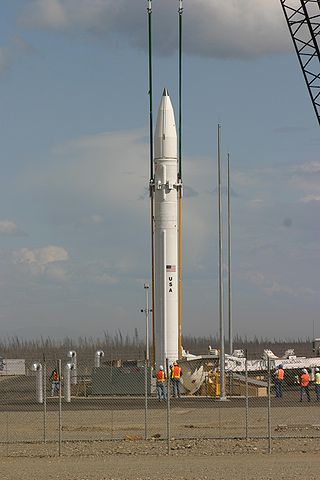The Lockheed Martin Corporation is an American aerospace, arms, defense, information security, and technology corporation with worldwide interests. It was formed by the merger of Lockheed Corporation with Martin Marietta in March 1995. It is headquartered in North Bethesda, Maryland, in the Washington, D.C. area. As of January 2022, Lockheed Martin employs approximately 115,000 employees worldwide, including about 60,000 engineers and scientists.

The U.S. Government Accountability Office (GAO) is an independent, nonpartisan government agency within the legislative branch that provides auditing, evaluative, and investigative services for the United States Congress. It is the supreme audit institution of the federal government of the United States. It identifies its core "mission values" as: accountability, integrity, and reliability. It is also known as the "congressional watchdog". The agency is headed by the Comptroller General of the United States. The Comptroller General is appointed by the President with the advice and consent of the Senate. When a vacancy occurs in the office of the Comptroller General, Congress establishes a commission to recommend individuals to the President.The commission consists of the following:
The State Auditor of North Carolina is a statewide elected office in the U.S. state of North Carolina. The state auditor is a constitutional officer responsible for overseeing and reviewing the financial accounts of all state government agencies. The auditor also conducts performance audits of state agencies, ensures state agencies' accounting conforms with Generally Accepted Accounting Principles, evaluates the integrity of computer-generated information, and investigates the misuse of state funds or property. The incumbent is Beth Wood, who became state auditor on January 10, 2009.
The Canada Revenue Agency is the revenue service of the Canadian federal government, and most provincial and territorial governments. The CRA collects taxes, administers tax law and policy, and delivers benefit programs and tax credits. Legislation administered by the CRA includes the Income Tax Act, parts of the Excise Tax Act, and parts of laws relating to the Canada Pension Plan, employment insurance (EI), tariffs and duties. The agency also oversees the registration of charities in Canada, and enforces much of the country's tax laws.

Ground-Based Midcourse Defense (GMD) is the United States' anti-ballistic missile system for intercepting incoming warheads in space, during the midcourse phase of ballistic trajectory flight. It is a major component of the American missile defense strategy to counter ballistic missiles, including intercontinental ballistic missiles (ICBMs) carrying nuclear, chemical, biological or conventional warheads. The system is deployed in military bases in the states of Alaska and California; in 2018 comprising 44 interceptors and spanning 15 time zones with sensors on land, at sea, and in orbit. In 2019, a missile defense review requested that 20 additional ground-based interceptors be based in Alaska.
In the United States, Office of Inspector General (OIG) is a generic term for the oversight division of a federal or state agency aimed at preventing inefficient or unlawful operations within their parent agency. Such offices are attached to many federal executive departments, independent federal agencies, as well as state and local governments. Each office includes an inspector general and employees charged with identifying, auditing, and investigating fraud, waste, abuse, embezzlement and mismanagement of any kind within the executive department.
Government Accountability Office investigations of the Department of Defense (DoD) are typically audits in which the Government Accountability Office (GAO), the United States Congress' investigative arm, studies how the Department of Defense spends taxpayer dollars. Since the GAO is accountable only to the legislative branch, it is in a unique position to investigate the military; no other agency can audit Federal departments with the same degree of independence from the President. However, the GAO is still subject to influence from powerful members of Congress. As of March 2016, the DoD was the only government agency to have failed every audit since all government agencies were required to pass such audits by the Chief Financial Officers Act of 1990.

The military budget is the largest portion of the discretionary United States federal budget allocated to the Department of Defense, or more broadly, the portion of the budget that goes to any military-related expenditures. The military budget pays the salaries, training, and health care of uniformed and civilian personnel, maintains arms, equipment and facilities, funds operations, and develops and buys new items. The budget funds six branches of the U.S. military: the Army, Navy, Marine Corps, Air Force, Coast Guard, and Space Force.

The Defense Contract Management Agency (DCMA) is an agency of the United States federal government reporting to the Under Secretary of Defense for Acquisition and Sustainment. It is responsible for administering contracts for the Department of Defense (DoD) and other authorized federal agencies. Its headquarters is located at Fort Gregg-Adams, Virginia. DCMA sometimes handles Foreign Military Sales contracts.

The Defense Finance and Accounting Service (DFAS) is an agency of the United States Department of Defense (DOD), headquartered in Indianapolis, Indiana. DFAS was established in 1991 under the authority, direction, and control of the Under Secretary of Defense (Comptroller)/Chief Financial Officer to strengthen and reduce costs of financial management and operations within DOD. DFAS is responsible for all payments to servicemembers, employees, vendors, and contractors. It provides business intelligence and finance and accounting information to DOD decisionmakers. DFAS is also responsible for preparing annual financial statements and the consolidation, standardization, and modernization of finance and accounting requirements, functions, processes, operations, and systems for DOD.

Washington Headquarters Services (WHS) is a Department of Defense (DoD) Field Activity, created on October 1, 1977, to provide administrative and management support to multiple DoD components and military departments in the National Capital Region and beyond.

Future Combat Systems (FCS) was the United States Army's principal modernization program from 2003 to early 2009. Formally launched in 2003, FCS was envisioned to create new brigades equipped with new manned and unmanned vehicles linked by an unprecedented fast and flexible battlefield network. The U.S. Army claimed it was their "most ambitious and far-reaching modernization" program since World War II. Between 1995 and 2009, $32 billion was expended on programs such as this, with little to show for it.
The Cunningham scandal is a U.S. political scandal in which defense contractors paid bribes to members of Congress and officials in the U.S. Defense Department, in return for political favors in the form of federal contracts. Most notable amongst the recipients of the bribes was California Congressman Duke Cunningham who pleaded guilty to receiving over $2.3 million in bribes. The primary defense contractors were Mitchell Wade and Brent R. Wilkes.

The California executive branch consists of elected officers and other offices and officers. The elected executive officers are:

The United States Department of Defense is an executive branch department of the federal government of the United States charged with coordinating and supervising all agencies and functions of the U.S. government directly related to national security and the United States Armed Forces. As of June 2022, the U.S. Department of Defense is the largest employer in the world, with over 1.34 million active-duty service members, including soldiers, marines, sailors, airmen, and guardians. DoD also maintains over 778,000 National Guard and reservists, and over 747,000 civilians bringing the total to over 2.87 million employees. Headquartered at the Pentagon in Arlington County, Virginia, just outside Washington, D.C., DoD's stated mission is to provide "the military forces needed to deter war and ensure our nation's security".

KC-X was the United States Air Force (USAF) program to procure its next-generation aerial refueling tanker aircraft to replace some of their older Boeing KC-135 Stratotankers. The contest was for a production contract for 179 new tankers with estimated value of US$35 billion. The two contenders to replace the KC-135 aircraft were Boeing and EADS, following the elimination of US Aerospace, Inc. from the bidding process.

The Pentagon military analyst program was a propaganda campaign of the U.S. Department of Defense (DoD) that was launched in early 2002 by then-Assistant Secretary of Defense for Public Affairs Victoria Clarke. The goal of the operation is "to spread the administration's talking points on Iraq by briefing retired commanders for network and cable television appearances," where they have been presented as independent analysts; a Pentagon spokesman said the Pentagon's intent is to keep the American people informed about the so-called War on Terrorism by providing prominent military analysts with factual information and frequent, direct access to key military officials. The Times article suggests that the analysts had undisclosed financial conflicts of interest and were given special access as a reward for promoting the administration's point of view. On 28 April 2008, the Pentagon ended the operation. A DoD Inspector General investigation found no wrongdoing on the part of the DoD.

Trailblazer was a United States National Security Agency (NSA) program intended to develop a capability to analyze data carried on communications networks like the Internet. It was intended to track entities using communication methods such as cell phones and e-mail.

The Special Inspector General for Afghanistan Reconstruction (SIGAR) is the U.S. government's leading oversight authority on Afghanistan reconstruction. Congress created the Office of the Special Inspector General for Afghanistan Reconstruction to provide independent and objective oversight of the Afghanistan Reconstruction funds. Under the authority of Section 1229 of the National Defense Authorization Act for Fiscal Year 2008, SIGAR conducts audit, inspections, and investigations to promote efficiency and effectiveness of reconstruction programs, and to detect and prevent waste, fraud, and abuse of taxpayer dollars. SIGAR also has a hotline that allows individuals to report suspected fraud.
Basis of Estimate is a tool used in the field of project management by which members of the project team, usually estimators, project managers, or cost analysts, calculate the total cost of the project. Through carefully planned equations, hierarchical listing of elements, standard calculations, checklists of project elements and other methods, the project team adds in all expenses of a project, from labor to materials to administrative costs. These calculations formulate a Basis of Estimate which is, when completed, a number that can be used to determine the ability of the firm or company to carry out the project, or used as a tool in competing for a contract bid or otherwise proposing the project to another.














